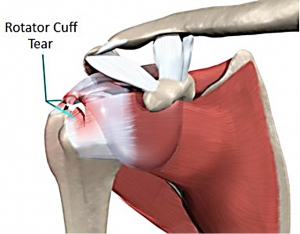Unfortunately, insurance companies are increasingly denying rotator cuff surgery personal injury claims. They will often times look through prior medical records for evidence of any prior problems with the shoulder, no matter how minor, and then argue that the condition is wholly degenerative and has nothing to do with the traumatic incident. They do this even when it is clearly your surgeon’s opinion that the automobile wreck or other incident caused the surgery to be necessary. What is worse is that the insurance companies will often times hire an orthopedic doctor to testify that the injury is unrelated. They tend to hire the same 1 or 2 doctors who will almost always give the same exact opinion without ever examining the patient. They pay these doctors thousands of dollars each time and receive the same opinion time after time. The truth is that insurance companies fight these cases because they think by hiring a high priced doctor to combat the testimony of your actual surgeon, they can avoid having to pay for your medical expenses, lost wages, and pain and suffering.
One of the most complicated joints in the human body is the shoulder. The shoulder is an unstable joint where the upper arm (humerus) meets the shoulder blade (scapula). The rotator cuff is a group of muscles and tendons that help keep the head of the humerus in place within the glenoid cavity of the scapula. Over time, everyone’s rotator cuff will degenerate to some degree or another. People who have jobs where they regularly place a lot of stress on their shoulder may experience more degeneration than the rest of us. In most cases, though, these blue collar workers will never need surgical repair of their rotator cuff. They’ll just deal with some discomfort and limitation from time to time.
A traumatic event such as a car wreck or fall can “aggravate,” “activate,” or make symptomatic previously minor rotator cuff problems. You can think of the humeral head as a balloon held in the glenoid cavity by a series of cables (the rotator cuff). If just a few of these cables degenerate, the humeral head will remain in place and may not cause any symptoms. If a traumatic event causes more of the cables to detach or wear down, the result can be tremendous pain, instability, and lack of functionality in the shoulder. When this happens, conservative treatment (such as steroid injections or physical therapy) will often times fail, requiring a surgical rotator cuff repair.

Rotator cuff surgery is typically a complex, multi-part procedure. There are many steps involved in trying to repair the shoulder joint. The first step in the surgery is typically an arthroscopy. The surgeon will make an incision and insert a small camera into the joint. After the surgeon has visualized any problems, he or she will go on to make the repairs. One of the first steps is typically a subacromial decompression. The acromion is a curved bone at the top of your shoulder that can grow bone spurs that rub against the rotator cuff. Shaving the acromion can make sure it does not do so in the future.
The next step in the surgery might be debridement of the rotator cuff tendon. This essentially involves shaving down the tendon to healthy tissue and removing any of its bad tissue. The surgeon will then either re-attach the tendon to the humeral head using anchor screws or, in other circumstances, stitch the rotator cuff tendons back to one another. It is also common nowadays for shoulder surgeons to perform a biceps tenodesis in conjunction with a rotator cuff repair. This involves cutting the biceps tendon which is attached to the top of the humeral head at the labrum and then re-attaching it somewhere else along the humerus or in the bicipital groove. This can be accomplished several different ways, but many surgeons drill a deep hole in the arm, place in an anchor screw, and then stitch the biceps tendon to that screw. In some rotator cuff surgeries, the surgeon may also need to cut off a piece of your clavicle bone. This is called a clavicle rescission.
You deserve an advocate on your side who knows the medicine, knows the insurance company’s playbook, and who will fight to expose the insurance companies manipulative tactics. To speak with the North Carolina rotator cuff surgery personal injury attorneys at Maginnis Law, please visit our contact page. From our Raleigh offices, we offer free consultations. If we represent you, we’re glad to offer contingency fee arrangements, whereby you owe no attorneys’ fees unless and until we recover a settlement of verdict on your behalf.





